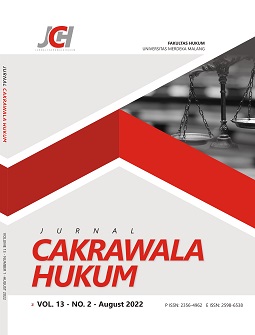Granting a compulsory will to grandfather and grandmother based on Aristotle's distributive theory
DOI:
https://doi.org/10.26905/idjch.v13i3.8855Keywords:
Aristotle’s Distributive Justice Theory, Grandparent, Testament Wajibah.Abstract
There is no legal basis for giving testament wajibah to a grandparent in Indonesia. However, the Religious Courts of Tarakan, in decision number: 610/Pdt.G/2014/PA.Trk. the judges gave testament wajibah portion of the inheritance to the grandparent because the heir’s mother blocked their position and the parenting role carried out by the grandparent since the mother left the heir, and her existence was unknown. The judge’s decision must consider the principles of legal certainty, benefits, and a sense of justice for the parties. Therefore, this research focuses on the judge’s legal reasoning in decision number: 610/Pdt.G/2014/PA.Trk. and how the judge’s decision is seen from the perspective of Aristotle’s distributive justice theory. This research is juridical-normative with cases and conceptual approaches. The results showed that the judge’s legal reasoning through the process of de heuristic and de legitimate, legal basis that judges used are the holy Qur’an, hadith, KHI, and Islamic law. The judges consider the role of grandparents during the heir to life. And giving testament wajibah to grandparents is considered fair based on Aristotle’s distributive justice theory because they have fulfilled the proportional principle requirements.
How to cite item:ÂSaiban, K., Al Kaswy, T., & SJ, F. (2022). Granting a compulsory will to grandfather and grandmother based on Aristotle's distributive theory. Jurnal Cakrawala Hukum, 13(3), 272-280. DOI:https://doi.org/10.26905/idjch.v13i3.8855.
Downloads
References
Adlhiyati, Z., & Achmad. (2019). Melacak Keadilan dalam Regulasi Poligami: Kajian Filsafat Keadilan Aristoteles, Thomas Aquinas, dan John Rawls. Undang: Jurnal Hukum, 2(2), 409–431. DOI: https://doi.org/10.22437/ujh.2.2.409-431.
Al Amruzi, M. F. (2014). Rekonstruksi Wasiat Wajibah dalam Kompilasi Hukum Islam. Sleman: Aswaja Pressindo.
Aristoteles. (2004). The Nicomachean Ethics. terj. Embun K. Jakarta: Mizan Publika.
Aristoteles. (1999). Nicomachean Ethics. terj. W.D.Ross. Kitchener: Batoche Books.
Darmodiharjo, D. (1995). Pokok-Pokok Filsafat Hukum: Apa dan Bagaimana Filsafat Hukum Indonesia. Jakarta: Gramedia Pustaka Utama. https://books.google.co.id/books?id=Xa22DeTfZ60C.
Ginsberg, M. (2003). Keadilan dalam Masyarakat. Bantul: Pustaka Jogja Mandiri.
Ismail, A. H. (2020). Pemberian Wasiat Wajibah Kepada Istri Non Muslim Menurut Putusan Mahkamah Agung RI NO. 16K/AG/2010. Jurnal Mercatoria, 13 (2), 131–142. DOI: https://doi.org/10.31289/mercatoria.v13i1.4060.
Kompilasi Hukum Islam.
Mappiasse, S. (2021). Logika Hukum Pertimbangan Putusan Hakim (Pertama). Jakarta: Kencana.
Massiare, M., & Yasen, S. (2017). Analisis Putusan Pengadilan Agama Tentang Pembagian Warisan Terhadap Kesejahteraan Keluarga. Jurnal Hukum Ekonomi Syariah, 1(2), 210–222. DOI: https://doi.org/10.26618/j-hes.v1i2.1654.
Moechtar, O., Valentino, B., & Wahono, D. (2020). Kajian komparatif lembaga penolakan waris dalam perspektif hukum waris adat dan Islam. Jurnal Cakrawala Hukum, 11(3), 291-301. DOI: https://doi.org/10.26905/idjch.v11i3.4225.
Moho, H. (2019). Penegakan Hukum di Indonesia Menurut Aspek Kepastian Hukum, Keadilan, dan Kemanfaatan. Jurnal Warta, 13(1), 138–149. DOI: https://doi.org/10.46576/wdw.v0i59.349.
Putusan Pengadilan Agama Tarakan, Nomor 610/Pdt.G/2014/PA.Trk.
Saiban, K. (2018). Hukum Kewarisan dalam Islam. Malang: Unmer Press.
Setiawan, E. (2017). Penerapan Wasiat Wajibah Menurut Kompilasi Hukum Islam (KHI) dalam Kajian Normatif Yuridis. Jurnal Muslim Heritage, 1(2), 43–61. DOI: https://doi.org/10.21154/muslimheritage.v2i1.1045.
Susanto, C., Siti Hamidah, S., & Rachmi Sulistyarini, R. (2020). Kedudukan hukum dan hak waris anak hasil inseminasi buatan dari ayah yang telah meninggal. Jurnal Cakrawala Hukum, 11(3), 302-312. DOI: https://doi.org/10.26905/idjch.v11i3.5475.
Tanya, B. L., Simanjuntak, Y. N., & Hage, M. Y. (2019). Teori Hukum Strategi Tertib Manusia Lintas Ruang dan Generasi. Yogyakarta: Genta Publishing.
Taqiuddin, H. U. (2017). Penalaran Hukum (Legal Reasoning) Dalam Putusan Hakim. Jurnal Ilmu Sosial Dan Pendidikan, 1(2), 191–199. DOI: https://doi.org/10.36312/jisip.v1i2.343.
Undang-Undang Republik Indonesia Nomor 23 Tahun 2002 Tentang Perlindungan Anak.
Additional Files
Published
How to Cite
Issue
Section
License
Copyright (c) 2022 Jurnal Cakrawala Hukum

This work is licensed under a Creative Commons Attribution-ShareAlike 4.0 International License.
Authors who publish in this journal agree to the following terms:
The copyright of the received article shall be assigned to the journal as the publisher of the journal. The intended copyright includes the right to publish the article in various forms (including reprints). The journal maintains the publishing rights to the published articles. Authors must agree to the copyright transfer agreement by checking the Copyright Notice column at the initial stage when submitting the article.









